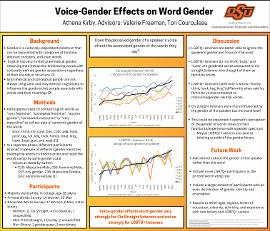| dc.contributor.advisor | Freeman, Valerie | |
| dc.contributor.advisor | Courouleau, Tori | |
| dc.contributor.author | Kirby, Athena | |
| dc.date.accessioned | 2023-04-12T20:39:58Z | |
| dc.date.available | 2023-04-12T20:39:58Z | |
| dc.date.issued | 2023-04-18 | |
| dc.identifier | oksd_URS_2023_kirby | |
| dc.identifier.citation | Kirby, A., Freeman, V., & Courouleau, T. (2023, April 18). Voice-gender effects on word gender. Poster session presented at the Oklahoma State University Undergraduate Research Symposium, Stillwater, OK. | |
| dc.identifier.uri | https://hdl.handle.net/11244/337403 | |
| dc.description.abstract | Purpose: Gender is a culturally-dependent construct that can be associated with categories of humans, abstract concepts, and even words. In languages that have explicit gender markings, like French and German, words may have both grammatical gender and conceptual or semantic gender associated with the words’ meanings (i.e., things associated with masculinity or femininity). Grammatical and conceptual gender are not always congruent and may interact cognitively to influence the genders that people associate with words and their meanings. English has very limited grammatical gender, removing that interaction and leaving words with culturally defined gender associations regardless of their sounds or structure (e.g., doll, soft vs ball, tough). Human gender is perceived in voices through combinations of acoustic features like pitch and intonation. This study asks how the perceived gender of a speaker’s voice affects the associated gender of the words they say. Method: In a survey study, college aged students (18-24) rate 20 English words as “very feminine”, “somewhat feminine”, “none/any gender”, “somewhat masculine” or “very masculine” to collect data of perceived gender of the words. In a separate phase, participants listen to people of different gender identities reading the words and rate the words using the same gender scale. Ratings are compared to show influences of perceived voice-gender on conceptual word gender, with ratings of gender-neutral words determining baseline voice-gender perceptions. Results: Voice-gender affects word-gender very strongly for Cis Straight listeners and not as strongly for LGBTQ+ listeners. LGBTQ+ listeners do not think "book" and "cook" are gendered words compared to cis straight listeners who thought of them as feminine words. Cis-straight listeners were more influenced by the gender of the speaker but the word itself. This could be explained if a person's perception of the gender of words relies on their familiarity/experience with a gender spectrum. | |
| dc.format | application/pdf | |
| dc.language | en_US | |
| dc.publisher | Oklahoma State University | |
| dc.rights | In the Oklahoma State University Library's institutional repository this paper is made available through the open access principles and the terms of agreement/consent between the author(s) and the publisher. The permission policy on the use, reproduction or distribution of the article falls under fair use for educational, scholarship, and research purposes. Contact Digital Resources and Discovery Services at lib-dls@okstate.edu or 405-744-9161 for further information. | |
| dc.title | Voice-gender effects on word gender | |
| osu.filename | oksd_URS_2023_kirby.pdf | |
| dc.description.department | Communication Sciences and Disorders | |
| dc.type.genre | Poster | |
| dc.type.material | Text | |
| dc.type.material | Image | |
| dc.subject.keywords | semantic gender | |
| dc.subject.keywords | gender perception | |
| dc.subject.keywords | voice perception | |
| dc.subject.keywords | LGBTQ+ | |
| dc.subject.keywords | American English | |
